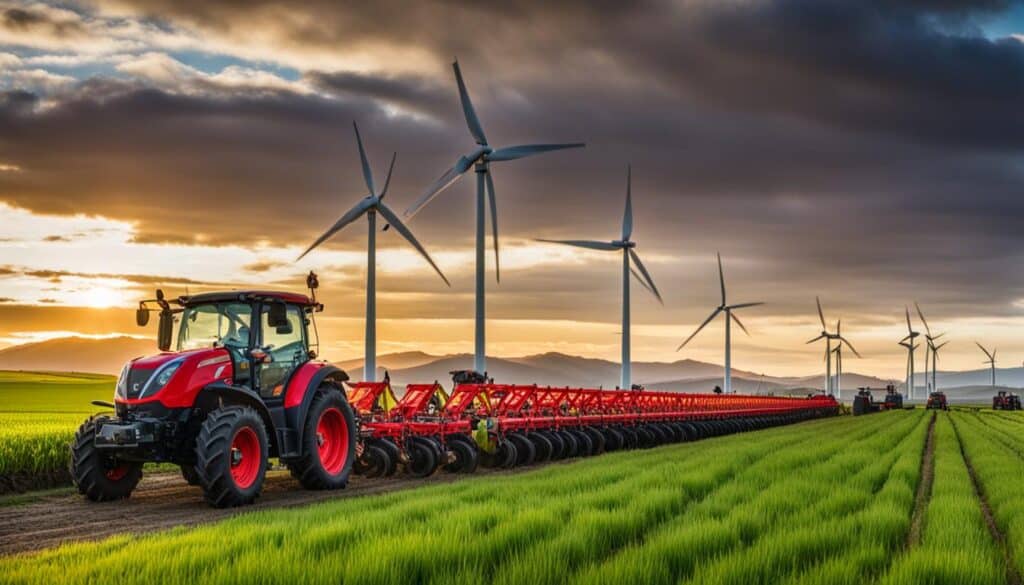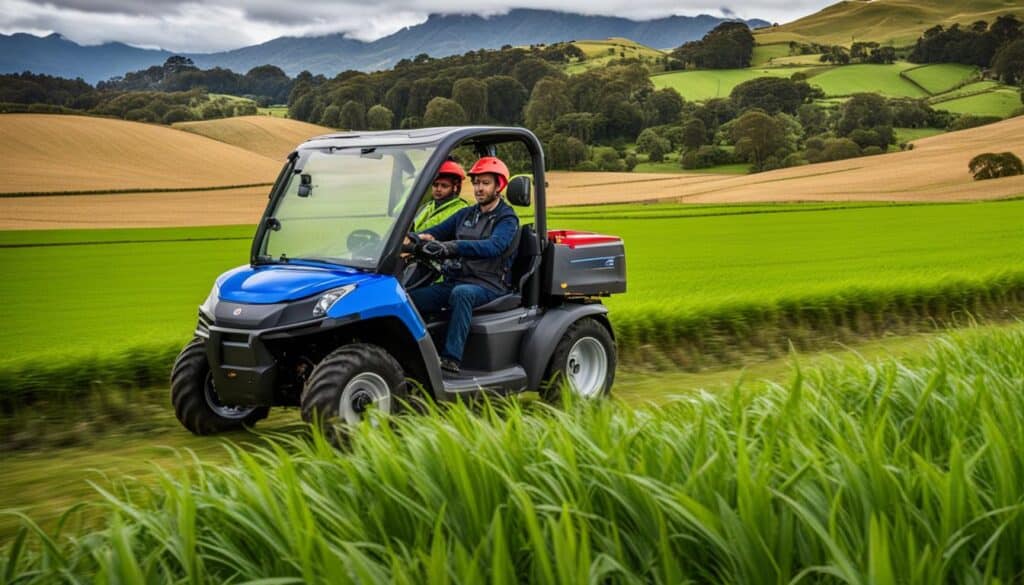Greetings! I’m thrilled to delve into the exciting world of electric farm vehicles in New Zealand. As the country sets ambitious targets for greenhouse gas emissions reduction, the farming sector is embracing eco-friendly technologies to support sustainable agriculture. Electric farm vehicles are at the forefront of this green revolution, offering numerous benefits for farmers and the environment.
With over 80% of New Zealand’s electricity being generated from renewable sources, the foundation for widespread adoption of electric farm vehicles is strong. However, there are still some challenges to overcome, such as the availability of charging infrastructure. But fear not, as we explore the potential of electric farm vehicles, we’ll also discuss the opportunities and solutions that lie ahead.
Key Takeaways:
- Electric farm vehicles are a vital part of New Zealand’s sustainability efforts in reducing greenhouse gas emissions.
- These vehicles offer benefits such as zero emissions, lower operating costs, and a more comfortable working environment for farmers.
- Challenges include the need for an improved charging infrastructure and higher initial costs.
- Investing in clean energy sources like solar and wind power can drive the adoption of electric farm vehicles.
- The future of electric farm vehicles in New Zealand looks promising, with advancements in technology and ongoing research and development.
Benefits of Electric Farm Vehicles
Electric farm vehicles provide numerous benefits for farmers and the environment. These eco-friendly farm vehicles are revolutionizing sustainable agriculture in New Zealand, contributing to a greener and more sustainable future.
- Zero Emissions: Electric farm vehicles produce zero emissions during operation, helping to reduce greenhouse gas emissions and combat climate change. By transitioning from traditional diesel-powered vehicles to electric ones, farmers can significantly reduce their carbon footprint and contribute to a cleaner and healthier environment.
- Reduced Air Pollution: With zero tailpipe emissions, electric farm vehicles help to improve air quality in rural areas. By eliminating harmful pollutants such as nitrogen oxides and particulate matter, these vehicles contribute to cleaner and healthier air for both farmers and nearby communities.
- Quieter Operation: Electric farm vehicles are much quieter compared to their diesel counterparts. This reduced noise level creates a more peaceful and comfortable working environment for farmers. It also helps to minimize noise pollution, especially in areas close to residential communities.
- Lower Operating Costs: Electric farm vehicles offer significant cost savings over traditional diesel-powered vehicles. They have lower maintenance requirements and cheaper fuel costs, especially when charged with renewable energy sources. By utilizing New Zealand’s abundant renewable energy, farmers can further reduce their operational expenses and increase profitability.
- Contribution to Sustainable Agriculture: Adopting electric farm vehicles is a crucial step towards achieving sustainable agriculture practices. These vehicles align with the country’s emission reduction targets and help farmers meet their sustainability goals. By integrating electric vehicles into their operations, farmers demonstrate their commitment to environmentally friendly and socially responsible farming practices.
Electric farm vehicles have the potential to transform the agricultural sector in New Zealand. With their eco-friendly features, lower operating costs, and contribution to sustainable agriculture, they are a win-win solution for farmers and the environment.
Challenges and Opportunities for Electric Farm Vehicles in NZ
While there are numerous benefits to using electric farm vehicles, it’s important to address the challenges that come with their adoption. One of the main hurdles is the availability of charging infrastructure. To ensure widespread use of electric farm vehicles in New Zealand, there is a need for an improved national charging-station network that caters specifically to the unique requirements of the farming sector.
Electric utility vehicles and farm machinery require reliable access to charging stations to ensure uninterrupted operations, especially during critical times such as harvest season or emergencies. An investment in infrastructure will not only benefit farmers but also contribute significantly to the country’s overall sustainability goals.
Another challenge is the initial cost of electric farm vehicles compared to traditional vehicles. While electric vehicles may have a higher upfront price tag, it’s important to consider the long-term cost savings they offer. With lower fuel costs and reduced maintenance requirements, farmers can experience significant savings in operational expenses over time. These savings can help offset the initial investment required for electric farm vehicles.
Moreover, there is a unique opportunity for New Zealand to leverage its abundant renewable resources, such as solar and wind power, to support the charging needs of electric farm vehicles. By investing in sustainable energy generation, the country can ensure a clean and reliable energy source for charging electric farm vehicles, further enhancing their eco-friendly nature.
Encouraging the development of electric farming solutions and supporting the infrastructure needed for sustainable practices also opens up new business opportunities in the farming sector. Companies involved in providing charging infrastructure, solar power solutions, and electric farm machinery can thrive in this emerging market, contributing to the growth of the overall economy.
Investing in charging infrastructure, leveraging renewable energy sources, and supporting sustainable farming practices are crucial steps in overcoming the challenges faced by electric farm vehicles in New Zealand. By doing so, we can pave the way for a greener and more efficient farming industry.
| Challenges | Opportunities |
|---|---|
| Limited charging infrastructure | Investment in charging-station network |
| Higher initial cost | Long-term cost savings in fuel and maintenance |
| Opportunity for renewable energy investment | |
| New business opportunities in the farming sector |
The Future of Electric Farm Vehicles in NZ
The future of electric farm vehicles in New Zealand is bright. As the technology continues to improve and become more affordable, we can expect a significant increase in their adoption within the farming sector. The New Zealand government’s commitment to achieving a net-zero emissions economy by 2050 provides a strong incentive for farmers to transition to electric vehicles that offer sustainable and eco-friendly solutions for their operations.
Advancements in battery technology have led to significant improvements in the range and carrying capacity of electric farm vehicles. This makes them highly suitable for a wide range of farming operations, allowing farmers to carry out their tasks efficiently and effectively. From transporting goods to tending to livestock, electric farm vehicles provide reliable and powerful performance.
Furthermore, ongoing research and development in electric farming equipment will continue to drive innovation and efficiency within the industry. Manufacturers and researchers are constantly working on developing new solutions and technologies to meet the specific needs of farmers. This ensures that electric farm vehicles will continue to evolve and adapt to the ever-changing demands of modern agriculture, making farming practices more sustainable and environmentally friendly.
With the growing awareness of the environmental impact of traditional farming practices, more farmers are looking for alternative solutions that minimize their carbon footprint. Electric farm vehicles offer a practical and effective way to reduce greenhouse gas emissions, contributing to a more sustainable agricultural industry. By transitioning to electric vehicles, farmers can play a crucial role in preserving the environment for future generations.

Benefits of Electric Farm Vehicles:
- Zero emissions, reducing greenhouse gas emissions and air pollution
- Quieter operation, providing a more comfortable working environment
- Lower operating costs, with reduced maintenance and cheaper fuel costs
- Contribution to sustainable agriculture practices and emissions reduction targets
In conclusion, the future of electric farm vehicles in New Zealand looks promising. With ongoing advancements in technology, increased affordability, and a strong government commitment to sustainability, farmers are increasingly embracing electric vehicles as a viable solution. The evolution of electric farming equipment and the continuous efforts to develop innovative solutions will further drive the adoption of electric farm vehicles across the country, paving the way for a greener and more sustainable farming industry.
Case Study: Kulan – Environmentally Friendly Farm Utility Vehicle
The Kulan project is an exciting endeavor developed by a consortium of 14 companies in New Zealand. It aims to explore the future of electric farm vehicles and their role in sustainable agriculture. One standout vehicle from the project is the Kulan, an environmentally friendly farm utility vehicle designed specifically for small and medium-sized farms.
The Kulan vehicle stands out with its clean and functional design, combining aesthetics with functionality. Its minimalistic approach offers flexibility for various farming applications, making it a versatile solution for farmers. Whether it’s carrying heavy loads or maneuvering through challenging terrains, the Kulan is up to the task.
One of the notable features of the Kulan is its impressive range. With a single charge, it can travel up to 185 miles, providing farmers with the flexibility to cover larger areas without worrying about running out of power. Furthermore, the vehicle’s lightweight design contributes to its energy efficiency and helps reduce soil compaction, ensuring sustainable farming practices.
This collaborative project highlights the dedication of New Zealand companies to developing innovative solutions for sustainable agriculture. By investing in electric farm machinery like the Kulan, farmers can reduce their carbon footprint and contribute to a greener future for the farming industry.
The Kulan – An electric farm vehicle designed for small and medium-sized farms.
Conclusion
Electric farm vehicles have the potential to revolutionize sustainable agriculture in New Zealand. With their numerous environmental and economic benefits, including reduced greenhouse gas emissions and lower operating costs, these vehicles offer a promising solution for farmers. Additionally, electric farm vehicles provide improved working conditions, offering a quieter and more comfortable environment for farmers.
Although there are challenges to overcome, such as the need for charging infrastructure, ongoing research and development in the field of electric farming equipment are paving the way for a greener future. As New Zealand continues to emphasize sustainability and invest in eco-friendly technologies, electric farm vehicles will play a crucial role in building a more sustainable farming industry.
By prioritizing the adoption of electric farm equipment, New Zealand can make significant strides towards a more sustainable and environmentally-friendly agriculture sector. These vehicles will not only help farmers meet their emissions reduction targets but also contribute to a cleaner and healthier environment.
FAQ
What are electric farm vehicles?
Electric farm vehicles are vehicles that are powered by electricity instead of traditional diesel or gas engines. They are designed specifically for use in farming and agriculture operations, offering a more sustainable and eco-friendly alternative to conventional vehicles.
What are the benefits of using electric farm vehicles?
Electric farm vehicles offer numerous benefits. They produce zero emissions, reducing greenhouse gas emissions and air pollution. They also have lower operating costs, require less maintenance, and provide a quieter and more comfortable working environment for farmers.
What are the challenges of using electric farm vehicles?
One of the main challenges is the availability of charging infrastructure. To ensure widespread adoption of electric farm vehicles, an improved national charging-station network is needed. Additionally, the initial cost of electric farm vehicles may be higher compared to traditional vehicles.
What is the future of electric farm vehicles in New Zealand?
As technology improves and becomes more affordable, we can expect to see a greater adoption of electric vehicles in the farming sector. The government’s commitment to becoming a net-zero emissions economy by 2050 provides a strong incentive for farmers to transition to electric farm vehicles.
Can you provide a case study of an environmentally friendly farm utility vehicle?
One example is the Kulan project in New Zealand. Kulan is an electrically powered vehicle designed for small and medium-sized farms. It offers a clean and functional design, with a focus on minimalism and flexibility for different applications.




